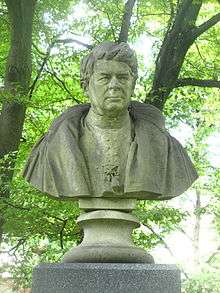Karl von Pfeufer
Karl Sebastian von Pfeufer (22 December 1806 – 13 September 1869) was a German physician who was a native of Bamberg.
He studied at Erlangen and Würzburg, and afterwards became an assistant to Johann Lukas Schönlein (1793–1864). In 1840 he became a professor and director at the clinic of internal medicine in Zurich, and in 1844 he succeeded Theodor Bischoff (1807–1882) as professor of pharmaceutical instruction at Heidelberg. In 1852 he became a clinical professor at Munich. Some of his better known students and assistants were Friedrich Albert von Zenker (1825–1898), Adolf Kussmaul (1822–1902), Theodor von Dusch (1824-1890) and Otto Leichtenstern (1845–1900).

Karl Pfeufer is remembered for his collaboration with Friedrich Gustav Jacob Henle (1809–1885), an association that began in the early 1840s at Zurich. The two doctors are credited as forerunners of German scientific medicine, and were pioneers in their attempts to create a synthesis between laboratory and clinic. In 1844 they founded a journal on "rational medicine" called Zeitschrift für rationelle Medizin,[1] which was to become one of the more important medical journals in the German language. Pfeufer would maintain written correspondence with Henle until his death in 1869.
Another publication by Pfeufer was an 1837 treatise on the cholera epidemic at Mittenwald, titled Bericht über die Cholera-Epidemie in Mittenwald.
Works about Karl von Pfeufer
- Der Briefwechsel zwischen Jakob Henle und Karl Pfeufer, 1843-1890, edited and revised by Hermann Hoepke. (Sudhoffs archive supplements, Issue 11.) Wiesbaden: Steiner, 1970 - The correspondence between Jakob Henle and Karl Pfeufer 1843-1869.[2]
References
- This article is based on a translation of an equivalent article from the German Wikipedia that includes:
- W. F. Bynum; Anne Hardy; Stephen Jacyna; Christopher Lawrence; E. M. Tansey (2006). The Western Medical Tradition: 800 B.C.-1800 A.D. Cambridge University Press.
- ↑ Jewish Encyclopedia Biography of Jacob Henle
- ↑ WorldCat Titles Der Briefwechsel zwischen Jakob Henle und Karl Pfeufer, 1843-1890.